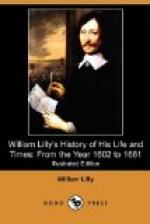The Lord General suddenly after brings in the long excluded Members to sit in Parliament, being persons of great judgment, and formerly enforced from sitting therein by the soldiery, and connivance of those who stiled themselves the godly part of the Parliament. These honourable patriots presently voted his Majesty’s coming into England, and so he did in May 1660. But because Charles the Second, now (1667) King of England, Son of Charles the First, grandchild to James the First, King of Great Britany, was so miraculously restored, and so many hundreds of years since prophesied of by Ambrose Merlin, it will not be impertinent to mention the prophecies themselves, the rather because we have seen their verification.
AMBROSE MERLIN’S PROPHECY WROTE ABOUT 990 YEARS SINCE.
He calls King James, The Lion of Righteousness; and saith, when he died, or was dead, there would reign a noble White King; this was Charles the First. The prophet discovers all his troubles, his flying up and down, his imprisonment, his death; and calls him Aquila. What concerns Charles the Second, is the subject of our discourse: in the Latin copy it is thus:
Deinde ab Austro veniet cum Sole super ligneos equos, & super spumantem inundationem maris, Pullus Aquilae navigans in Britanniam.
Et applicans statim tunc altam domum Aquilae sitiens, & cito aliam sitiet.
Deinde Pullus Aquilae nidificabit in summa rupe totius Britanniae: nec juvenis occidet, nec ad senem vivet.
This, in an old copy, is Englished thus:




